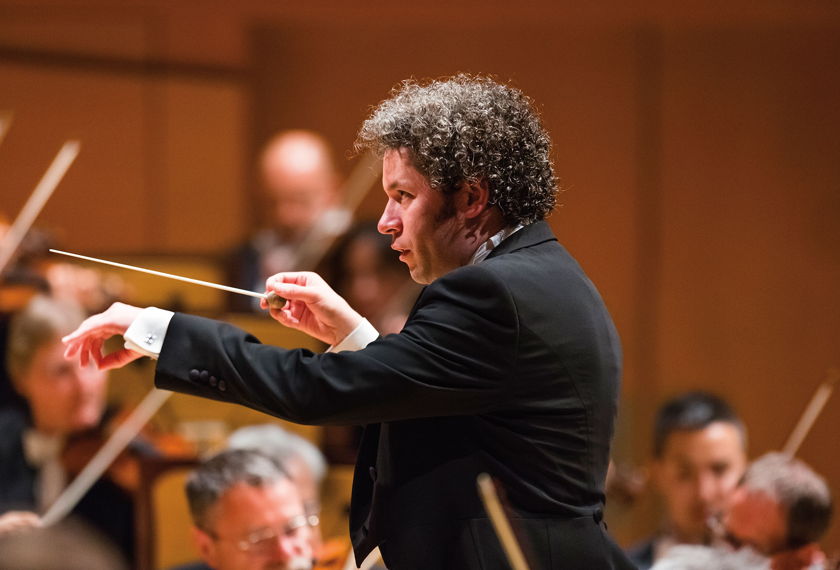
Gustavo Dudamel and the LA Phil are back, and Walt Disney Concert Hall is open for business.
On Oct. 14-16, Dudamel and the Phil presented their first concert of the 2021-2022 season after more than a year hiatus because of COVID-19. All of the necessary precautions were in place, including a mask mandate and evidence of vaccination required for entrance. The concert repeats today, Oct. 17, at 2 p.m.
Instead of a rousing opening piece or even an entire program of uplifting pieces, Dudamel chose kind of a downer program. But it was also a concert with a theme of transfiguration.
The first piece selected by Dudamel—indeed the first half—Verklärte Nacht (Transfigured Night), Op. 4, was an early work by Arnold Schoenberg originally written for string sextet in 1899 but scored for string orchestra by the composer in 1917. Despite Schoenberg’s evolution from the tonality of Wagner and Brahms—you read that right, Wagner and Brahms (remember that Schoenberg scored the Brahms Piano Quartet in G minor for orchestra), both of whom were to influence Schoenberg in obviously different ways—to the 12-tone music for which he is most remembered, he obviously felt an affinity for this early piece so much so that he returned to it twice in his life, once in 1917 to score it for string orchestra and then again in 1943 to revise it.
The score is based on a poem by the German poet Richard Dehmel. The poem tells the tale of a man and a woman who walk through the woods at night with the moon overhead. The woman tells the man she is pregnant by another man but that she loves the man with whom she is walking through the night. His reply is that the warmth between them will transfigure the child and that they will raise it together. The piece ends with shimmering in the violins suggesting the poem’s phrase that “all creation shimmers in the moonlight.”
On Saturday afternoon, Dudamel conducted the piece scoreless, with passion and a deep understanding of the sounds of a lush composition for string orchestra that perhaps only a string player such as Dudamel can pull off.
After intermission, Dudamel led the orchestra in Vier Letzte Lieder (Four Last Songs) by Richard Strauss, composed in the last two years of his life from 1947-1949. These four songs, really some of the most beautiful music ever composed, were not written to be performed as a song cycle, difficult as that is to believe because they go so well together. Collectively they speak of loss and conclude not on a sad or tragic note, but on a note of peace and tranquility. The last song—Im Abendrot (At Sunset)—literally ends with an inchoate reference to the last piece on the program, Tod und Verklärung (Death and Transfiguration).
The Four Last Songs were sung exquisitely by the South African soprano Golda Schultz, whose voice and appearance were radiant. Her control and dynamic range were impressive and were made all the more admirable by her almost child-like modesty at the conclusion. She seemed uncomfortable accepting the audience applause by herself, motioning first for Dudamel and then for Martin Chalifour (who in all three pieces had solos showing off his chops) to join her. In the end, she accepted the cheers and applause gracefully.

The final work on the program was Death and Transfiguration, and it was in this piece that Dudamel really showed how much he has matured not only as a conductor but as a person. Dudamel’s Death and Transfiguration was spellbinding and impassioned, and the performance realized Strauss’ transfiguration from an earthly existence to one of heavenly bliss. Dudamel exploited the dynamic range not only of the piece but of the orchestra and the hall that he knows so well to deliver a truly enthralling performance.
Most of the audience stayed until the last curtain call, which, to this reviewer, was a testament to the Phil’s transcendent performance of the Death and Transfiguration. Dudamel knew what he was doing by combining these works in this particular order. He took what seemed to be a program focused more on death and concluded it with a literal transfiguration for the audience.
The time off for COVID-19 certainly has not diminished the sound of the Phil. On the contrary, if Saturday’s performance was any indication, the orchestra seems to have gotten only better.
A final observation: There was almost no coughing by the audience. It must be that being in lockdown and wearing masks everywhere has kept everyone free from colds and the flu. That’s definitely a perk for classical audiences.
—Henry Schlinger, Culture Spot LA
For future concerts, visit https://www.laphil.com.





